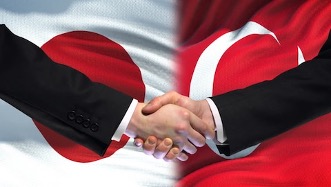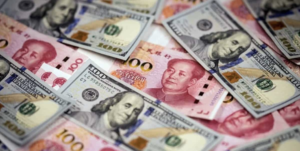Making the local news headlines, Japan has helped Turkey open a new hospital in May 2020 in Istanbul, named Başakşehir Çam and Sakura City Hospital (BCSC Hospital), to aid the country in its fight against the Covid-19 pandemic. Local health authorities expect the hospital to play a pivotal role in treating people infected with the novel coronavirus. Equipped with over 2,600 beds, the new hospital even surpasses Japan’s own Fujita Health University Hospital, one of the country’s most prominent with about 1,400 beds, in Toyoake, Aichi Prefecture.
While even the most prominent economic powers, such as the United States, face difficulties in winning the battle against Covid-19, cooperation between Japan and Turkey, based on medical assistance, appears as a substantial step towards the rapprochement between the two countries. Through this latest investment, Japan and Turkey are renewing their long-lasting bilateral economic and trade partnership, while showcasing their ability to collaborate in tackling a common challenge.
There is, however, another way to read into Japan’s aid to Turkey, for the former has long-established trade relations with Eurasian countries, of which Turkey is a major member. Through its financial and technical assistance in opening BCSC Hospital, it is possible to see Japan hard at work deepening its political and economic influence in the region. Taking into account Japan’s trade conflicts closer to home with South Korea and China, it does not come as a surprise that Japan has been working actively towards enhancing its relations with Turkey and reinforcing bilateral relations based on infrastructure-building, as has been the case with the construction of the Osmangazi Bridge and the Fatih Sultan Mehmet Bridge.
Japan-Turkey relations prior to the Covid-19 pandemic
Analyzing Japan’s strategic investment in Turkey in the pre-Covid years, one of the most significant steps occurred on November 23, 2019, when the two countries aimed to announce the Japan-Turkey Economic Partnership Agreement (EPA) by the end of the year. Praising his Japanese counterpart, Toshimitsu Motegi, for a “fruitful” meeting, Turkish Minister of Foreign Affairs Mevlüt Çavuşoğlu confirmed that the EPA would stand at the core of bilateral relations between the two countries. In this light, the recent inauguration of BCSC Hospital should be seen as evidence of Japan’s commitment to the betterment of bilateral political and trade relations.
When taking into account Japan’s rocky relations with its near neighbors (namely South Korea and China), its recent endeavors in Turkey take a whole different importance in that it illustrates a “bypass strategy” whereby Japan works at strengthening ties with partners in Europe, Eurasia, and the Middle East. Stuck in historical and territorial disputes (the “comfort women” issue with South Korea and territorial claims over the Senkaku/Diaoyu islands with China, to name but a few) leading to renewed trade tensions, a survey conducted by the Pew Research Center in 2014 revealed that 85% of Japanese were concerned that territorial disputes between China and neighboring countries could lead to military conflict, with dire economic and trade consequences. Moreover, as Beijing deploys a new deep-water drilling rig in the South China Sea, Japan faces a new challenge: struggling to secure oil and natural gas supplies needed to fuel its economy, particularly since the post-Fukushima shutting down of most Japanese nuclear power plants.
These developments have resulted in a shift in Japan’s investment policies. Diverging from its traditional Asia-Pacific trade partners, Japan has redeployed its investment efforts in other regions of the globe to diversify risk and capitalize on more neutral, if not downright welcoming, environments. One example of such venture is Japan’s taking on China in Africa. With its investments in the region, Japan has been challenging China’s Belt and Road Initiative, a move it has since repeated in Latin America. The financing and launching of Istanbul’s BCSC Hospital is one such endeavor by Japan at striking a major, high-profile deal in Turkey, a country where China has been most active in the recent years.
Thus, Japan’s motives behind the construction of BCSC Hospital reveal a dual challenge. First, Japan feels that its economic and trade alliances with other Asia-Pacific countries are in jeopardy in the face of China’s aggressive investment in ASEAN. Second, Japan aspires to bypass China and approach Europe and the Middle East — and Turkey, for its strategic and geopolitical significance, can be used as a stepping-stone and a bridge between these two regions.
Bilateral relations rooted in history and strategic necessity
Having amicable historical relations with Turkey, Japan perceives it as a reliable economic partner. Moreover, Japan has to compete with other Asian nations if it is to establish fruitful partnerships with Turkey. For instance, in 2012, Japan was merely the fourth biggest East Asian economic partner of Turkey, after China, India, and South Korea. BCSC Hospital, therefore, is a clear example of Japan’s endeavors to lessen the gap and compete with its Asian counterparts. Much like the planned Sinop Nuclear Power Plant, the TÜRKSAT 4A satellite, and the Izmit Bridge Passing project, all involving Japanese companies, Japan keeps investing in Turkey to manufacture a geopolitically and strategically crucial economic partner.
Another decisive reason for Japan in tightening its relations with Turkey is crude oil. Turkey’s state-run oil and gas company has been granted licenses by the Turkish government to explore for oil and gas in 24 locations in the East Mediterranean. As the Black Sea and Mediterranean areas have gained exceptional momentum in terms of their wealth in petroleum and natural gas, Turkey has suddenly made an appearance in the list of alternative energy partners for Japan. As China is speeding up its natural gas exploration in the South China Sea in partnership with Malaysia’s Petronas, and Iranian and Venezuelan oil remain out of reach as a result of a US embargo, Japan is frantic in its search for alternative supply sources.
In this respect, Turkey has geopolitical significance and presents several advantages for Japan. First, it has direct access to the natural resource-rich Black Sea region, is an entry point to the Middle East, and sits at the juncture of Europe and Asia. Second, contrary to its relations with China and South Korea, Japan has relations with Turkey that are rooted in largely positive history, going back to the 19th century. The year 2020 marks the 96th anniversary of the establishment of diplomatic relations between the two countries. Third, Turkey can function as a diplomatic and economic bridge between Japan and the Middle East. Japan has long invested in Africa, Europe, and Eurasia, and its rapprochement with Turkey can also enable the country to ascertain more beneficial economic relations with the Middle East, for Turkey’s location as well as its previous role during the Ottoman Empire period provides valuable business networks throughout the region.
On the back of this historical relationship, Japan is now turning the Covid-19 pandemic into an opportunity to deepen the bond with Turkey. Having invested in the country’s infrastructure for years, Japan now comes to Turkey’s aid with a modern hospital that the country direly needs to face Covid-19. Japan thus generates a tremendous amount of goodwill on the part of both the government of the Republic of Turkey and Turkish citizens, on the back of positive historical events that are still in the minds of many in Turkey today.
Among those are the saving of the entire crew of Ottoman imperial ship Ertuğrul Frigate in Kushimoto, Japan in 1890, or the positive response by Turkish authorities to Japan’s request in helping with the evacuation of Japanese citizens from Tehran in 1985. On the business side of history, Japanese entrepreneur Count Ōtani Kōzui came to Turkey and established the Ankara Industry and Agriculture Limited Company in 1927, together with a Turkish-Japanese textile mill in Bursa along with local business partner Saffet Beyzade Memduh Bey in 1929.
Yet, China’s Belt and Road Initiative (BRI) has recently overshadowed Japanese investments in Turkey, as Japan entered into a period of economic stagnation and has been struggling with adjusting to shifting world power dynamics. In a way, Covid-19 and the consequent cancellation of the 2020 Tokyo Olympics may be a blessing in disguise, as it forces Japan to become more diligent and resilient than ever to navigate these uncertain geo-economic waters.
A new step in Japan’s influence projection
Therefore, one should not consider Japan’s investments in Turkey as merely financial. In many respects, the inauguration of Başakşehir Çam and Sakura City Hospital (BCSC Hospital) has brought a breath of fresh air to Japan-Turkey political and economic relations. Once again, Japan has demonstrated its robust partnership with Turkey in the form of medical assistance during trying times.
Worth mentioning is a theory gaining momentum in Japan, “Pax Japonica”. Claiming that Japan should have more of a say in the world scene in terms of offering an alternative political economic model, champions of this theory are encouraging Japan to expand its economic footprint throughout the world and direct its efforts towards becoming, much like China is, a norm and standard setter. Only then can Japan expect to resurrect its economy, which is currently suffering from stagnation, topped with the cancellation of the 2020 Olympics. By diversifying away from East Asia and relying on carefully selected local allies (such as Turkey), Japan can recover its pre-Bubble Economy position, this time based on stable pillars of competitiveness, diversified alliances and an internationally recognized benevolent image.
In that sense, Japan’s gift to Turkey of BCSC Hospital gives us a hint as to its long-term strategy. Not only does Japan aims at enhancing its relations with Turkey, but it also plans to leverage its strong relations with Turkey as a means to access the Middle East. Japan wants to pursue deeper diplomatic relations with countries neighboring Turkey, thus freeing itself from the unpredictability of US foreign policy in the region. Therefore, the enhancement of the Japan-Turkey alliance can also provide Japan with more diversity of options in terms of energy security. By standing side by side with Turkey on the current health emergency, Japan can benefit from the crude oil and natural gas resources being explored by Turkey in the East Mediterranean. It can also build partnerships based on renewable energy resources such as solar, wind, and nuclear energy.
In conclusion, Başakşehir Çam and Sakura City Hospital is not only a healthcare investment Japan made in Turkey but should be seen first and foremost as the starting point of a new era in terms of Japan-Turkey relations and Japan’s strategic progress into the Middle East.
Picture credits: alamy.com






The mentioned “bypass strategy” operated by Japanese government may be a breakthrough under the long-term besieged diplomatic activities in Middle East, especially suffering from the so-called “checkbook diplomacy” carried out by Chinese government.
Moreover, Turkey could be an alternative energy partner of petroleum and natural gas for Japanese government due to her exploitation right in the Black Sea and Mediterranean areas. And Japan may pay back by her soft power such as infrastructure constructions.
However, we have noticed that the Chinese government has also announced a “health silk road” to provide medical supports to Turkey government such as free masks supply and on-line meetings among medical professionals for pandemic containment, which decided by the telephone conference between the Chinese President Xi Jinping and Turkish president Recep Tayyip Erdoğan in April.
Turkey has been closed to China recently, probably the economic stagnation and the IS terror problems have led Turkey to look for a powerful partner for cooperation. The investments form Chinese government and corporations in the field of energy, petrochemistry, mining etc., have raised about $5 billion dollars. And an enormous hydropower project has been contracted with the amount of $1.5 billion dollars between China Gezhouba Group Company and KAF Teknik Yapi in the end of March this year.
How do you look at it? No matter in Asia or in Middle east, to challenge the power of China seems to become the destiny of Japan.
While agreeing with you, I also want to add this is why “Pax Japonica” carries such a significant weight in terms of Japan’s economic resurrection by looking beyond Asia-Pacific. The rivalry in terms of financial investments between Japan and the People’s Republic of China appears to recapitulate. Therefore, Japan’s only option, if it is to revitalize its economic markets, is seeking alternatives, be it Turkey, Europe, or the Middle East.
One advantage Japan-Turkey relations have over Sino-Turkish ones is the Uighur issue, which stems from the history of discord between Chinese authorities and the indigenous ethnic Uighur population in the Xinjiang region. The Turkish government condemns China every time new documentation or a record of the suppression of the Uighurs in the Xinjiang region, come up in the news, and so on. Therefore, Japan has a historical advantage of keeping Turkey as its constant partner, which is also why I mentioned the deeply-rooted historical relations between Japan and Turkey in my article.
For instance, the construction of the Honotlu Thermal Power Plant in the Turkish state of Adana is currently the most massive Chinese investment in Turkey. Moreover, trade cooperation between China and Turkey reached $ 23.6 billion last year, making China the third-largest trade partner with Turkey after Russia and Germany. Chinese investments in Turkey amounted to $ 2.8 billion last year and valued at $ 15 billion between 2005 and 2018. Last but not least, China aims to increase its investment with Turkey by an annual volume of 6 billion dollars in 2021.
Therefore, analyzing such data, it is incontrovertible that Japan has a strong rival to establish its dominance over Turkey, the Middle East, or the Caucasian market. Yet, this is why it should—more than ever—give importance to its investments in Turkey and collaborate in energy security with the country. Only then can Japan become among the top 3 or 5 trade partners of Turkey, enabling it to supply its energy via more affordable partnerships and have a more influential economic claim over the Middle East and the Caucasus.